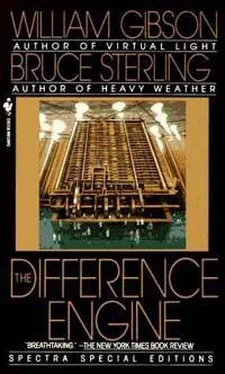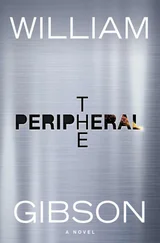William Gibson - The Difference Engine
Здесь есть возможность читать онлайн «William Gibson - The Difference Engine» весь текст электронной книги совершенно бесплатно (целиком полную версию без сокращений). В некоторых случаях можно слушать аудио, скачать через торрент в формате fb2 и присутствует краткое содержание. Жанр: sf_cyber_punk, fantasy_alt_hist, на английском языке. Описание произведения, (предисловие) а так же отзывы посетителей доступны на портале библиотеки ЛибКат.
- Название:The Difference Engine
- Автор:
- Жанр:
- Год:неизвестен
- ISBN:нет данных
- Рейтинг книги:3 / 5. Голосов: 1
-
Избранное:Добавить в избранное
- Отзывы:
-
Ваша оценка:
- 60
- 1
- 2
- 3
- 4
- 5
The Difference Engine: краткое содержание, описание и аннотация
Предлагаем к чтению аннотацию, описание, краткое содержание или предисловие (зависит от того, что написал сам автор книги «The Difference Engine»). Если вы не нашли необходимую информацию о книге — напишите в комментариях, мы постараемся отыскать её.
The Difference Engine — читать онлайн бесплатно полную книгу (весь текст) целиком
Ниже представлен текст книги, разбитый по страницам. Система сохранения места последней прочитанной страницы, позволяет с удобством читать онлайн бесплатно книгу «The Difference Engine», без необходимости каждый раз заново искать на чём Вы остановились. Поставьте закладку, и сможете в любой момент перейти на страницу, на которой закончили чтение.
Интервал:
Закладка:
Musical accompaniment was provided by a moon-faced organist—her eyes, it seemed to Oliphant, glinting either with lunacy or laudanum.
The pantomime had opened in what Oliphant supposed was meant to be taken as a hotel dining-room, with the peripatetic Roast Turkey—apparently played by a dwarf—attacking the diners with a carving-knife. Oliphant had very quickly lost track of the narrative, if indeed there were one, which he doubted. Scenes were punctuated repeatedly by characters firing stuffed bricks at one another's heads. There was kinotropic accompaniment, of a sort, though it consisted of crudely polemical cartoons that seemed to bear little relationship to the action.
Oliphant stole a glance at Mori, who sat beside him, his treasured topper upright on his lap, his face expressionless. The audience was howlingly rowdy, though less in response to the substance of the pantomime, whatever that might be, than to the whirling, curiously formless dances of the Communard women, their bare shins and ankles plainly visible beneath the ragged hems of their flowing garments.
Oliphant's back began to ache.
The choreography accelerated into a sort of balletic assault, the air thick with brickbats, until, quite abruptly, 'Mazulem the Night Owl' was ended.
The crowd hooted, applauded, jeered. Oliphant noted a hulking, gaunt-jawed man with a stout rattan over his shoulder, lounging beside the entrance to the pit. The fellow was watching the crowd through narrowed eyes.
"Come then, Mr. Mori. I sense a journalistic opportunity."
Mori stood, hat and evening-cane in hand. He followed Oliphant toward the pit.
"Laurence Oliphant, journalist." He presented his card to the hulking man. "If you would be so kind, you might convey this to Miss America with my request for an interview."
The man took the card, glanced at it, and let it fall to the floor. Oliphant saw the knobby fist tighten around the rattan. Mori emitted a brief hiss, as if of steam; Oliphant turned; Mori, his top-hat jammed firmly forward on his head, had assumed the pose of the samurai warrior, the handle of his evening-cane grasped in both his hands. Immaculate linen and gold links glinted at his supple wrists.
The untidily coiffed, extravagantly hennaed head of Helen America appeared. Her eyes were ringed with kohl.
Mori held his pose.
"Miss Helen America?" Oliphant produced a second card. "Allow me to introduce myself. I am Laurence Oliphant, journalist… "
Helen America performed a rapid manipulation before the stony face of her compatriot, as though she were conjuring something from the air. The man lowered his length of rattan, still glowering fiercely at Mori. The stick, Oliphant saw, was obviously weighted. "Cecil's a deaf mute," she said, pronouncing the name with a case-hardened American e.
"I'm very sorry. I offered my card—"
"He can't read. You say you're a newspaper-man?"
"An occasional journalist. And you, Miss America, are an authoress of the first-water. Allow me to introduce my good friend, Mr. Mori Arinori, an envoy of the Mikado of Japan."
With a deadly glance at Cecil, Mori reversed his cane with admirable grace, removed his hat, and bowed in the European fashion. Helen America, wide-eyed, regarded him as one might a trained dog. She wore a neatly mended military cloak, threadbare but apparently clean, in the shade of grey the Confederates called butternut, though the original regimental buttons had been replaced with plain round horn.
"I haven't ever seen a Chinaman dress like that," she said.
"Mr. Mori is Japanese."
"And you're a newspaper-man."
"After a fashion, yes."
Helen America smiled, revealing a gold tooth. "And did you enjoy our show?"
"It was extraordinary, quite extraordinary."
Her smile widened. "Then come to Manhattan, mister, for the People Risen have the old Olympic, east of Broadway, over Houston Street. We're best appreciated in our own venue." Thin bands of silver pierced her ears, amid a tangled cloud of hennaed curls.
"It would be my great pleasure. As it would be my pleasure to conduct an interview with the authoress of—"
"I didn't write that," she said, "Fox did."
"Pardon me?"
"George Washington Lafayette Fox—the Marxian Grimaldi, the Tamla of socialist pantomime! It was the Troupe's decision to put that I wrote it, though I continue to argue against it."
"But your prefatory message…"
"Now I did write that, sir, and am proud of it. But poor Fox… "
"I hadn't heard," Oliphant submitted, somewhat baffled.
"It was the terrible pressure of toil," she said. "The great Fox, who'd single-handedly elevated socialist pantomime to its present level of revolutionary importance, was sweated mad by one-night stands, sir; driven to sheer exhaustion at having to contrive sharper tricks and quicker transformations. He slid into dementia then, his grimaces hideous to behold." She had assumed her stage delivery; now she lapsed back into a more confidential tone. "He'd lapse into the crudest indecency, mister, so we kept his dresser in a monkey-suit, to run out and belabor him, if he got too obscene."
"I'm very sorry—"
"Manhattan's no place for the mad, sir, sad to say. He's in the asylum in Somerville, Massachusetts, and if you'd care to publish that, be my guest."
Oliphant found that he was staring at her, entirely at a loss for words. Mori Arinori had retired somewhat, and seemed to be watching the crowd as it made its way out of the Garrick. The deaf-mute Cecil had vanished, taking with him his shot-loaded length of rattan.
"I could eat a horse," Helen America said cheerfully.
"Allow me, please, to provide you with a meal. Where do you wish to dine?"
"There's a place around the corner." As she stepped from the topmost of the steps that ascended the pit, Oliphant saw that she wore a pair of the rubber boots Americans called Chickamaugas, great clumsy things of military origin. With Mori at his side, he followed her out of the Garrick. She had not waited for him to offer his arm.
She led them down the street, and as she had said, around a corner. Gas-light flared, before a clacking kino-sign that checkered from MOSES & SONS AUTOCAFE into CLEAN MODERN RAPID and back again. Helen America glanced back with an encouraging smile, her callipygian hips swaying beneath the Confederate cloak and the tattered muslin of her remarkable stage-garment.
The Autocafe was crowded and noisy, packed with Whitechapel locals. Its iron-mullioned windows were opaque with steam. Oliphant had seen nothing like it before.
Helen America demonstrated how business was conducted here, taking up a rectangular gutta-percha tray from a stack of the things, and pushing it along a ledge of shining zinc. Above the ledge were several dozen miniature windows, trimmed with brass. Oliphant and Mori followed her example. Behind each window, a different dish was displayed. Oliphant, noting the coin-slots, fumbled for his change-purse. Helen America chose a slice of shepherd's pie, a helping of toad-in-the-hole, and fried chips, Oliphant providing the requisite coinage. An additional tuppence produced a copious quantity of very dubious-looking brown gravy, from a spigot. Mori chose a baked potato, a particular favorite of his, but declined the gravy-spigot. Oliphant, disoriented by the oddness of the place, opted for a pint of machine-made ale, from another spigot.
"Clystra's liable to kill me for this," Helen America remarked, as they arranged their trays on a ridiculously small cast-iron table. The table, like the four chairs around it, was bolted into the concrete floor. "Doesn't hold with us talking to gentlemen of the press." She shrugged, beneath her butternut cloak. She smiled happily and began to sort a small pile of cheap tin-ware, giving Mori a knife and dinner-fork. "Have you been to a town called Brighton, mister?"
Читать дальшеИнтервал:
Закладка:
Похожие книги на «The Difference Engine»
Представляем Вашему вниманию похожие книги на «The Difference Engine» списком для выбора. Мы отобрали схожую по названию и смыслу литературу в надежде предоставить читателям больше вариантов отыскать новые, интересные, ещё непрочитанные произведения.
Обсуждение, отзывы о книге «The Difference Engine» и просто собственные мнения читателей. Оставьте ваши комментарии, напишите, что Вы думаете о произведении, его смысле или главных героях. Укажите что конкретно понравилось, а что нет, и почему Вы так считаете.









